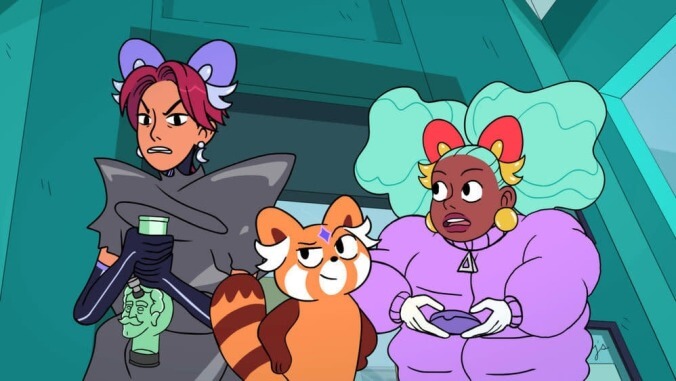Magical Girl Friendship Squad is fun, but banks more on dated millennial humor than lore

The ever-popular “typical millennial” narrative that has permeated media over the past decade is a pretty deceptive one. Leaning liberally on this notion of an emotionally fragile, fiscally irresponsible younger generation, many of the widespread presumptions tend to conveniently ignore the fact that the current ages of millennials actually range from mid-twenties to late thirties. We get it: The thought of an entire peer group randomly deciding to forgo home ownership in favor of avocado toast while systematically killing department stores is too delightfully absurd not to explore, even if it’s reductive and potentially ill-informed.
The inherent hurdle with TV that hitches itself to this typical millennial narrative is that in time, the humor begins to feel almost cyclical. After all, there are only so many ways to reference Snapchat and the gig economy before the dialogue turns rote. In some ways it seems SYFY’s adult animated comedy Magical Girl Friendship Squad—a series based on existing animated shorts created by Kelsey Stephanides—understands this, choosing to spin the more touted aspects of stereotypical millennial culture with anime-inspired lore and imagery. In other, more predictable ways, it still manages to rely on some of the same well-worn tropes of generational naiveté, even it is brevity. (Six 15-minute episodes are apparently all one needs to cram in some “millennials prefer making vision boards over finding a job” cracks.) But even with its occasionally dated quips, the charm of its cast and the faintest promise of adventure bring some promise to a show that still manages to entertain.
The titular squad begins with a humble duo. Brooklyn-based twentysomething best friends and roommates Daisy (voiced by Anna Akana) and Alex (voiced by Quinta Brunson) are newly jobless, somewhat aimless, and likely to spend more money at their local coffee shop than on groceries. As the pair begin to stress about their precarious living situation, they are visited by Nut, a universe-creating goddess cloaked as an unassuming red panda. Before anyone can dwell too much on this creature’s ability to talk, Nut informs Daisy and Alex that they are the fated guardians of their universe and must protect it from forces seeking to strip the planet of its life force. But, as they are quick to inform the furry goddess, they are ill-equipped to save the world when they can barely save themselves, life-or-death circumstances be damned. But when they encounter an energy-zapping CBD monster (yes, that CBD, to really ground us in the now of it all) wreaking havoc at their favorite coffee spot, their purpose becomes much clearer. With some assistance from Nut and their designated bewitched tokens (a pack of birth control for Alex, a Tom Selleck-inspired bong for Daisy), the young women transform into magic-wielding superheroes. For six quick episodes, their messy lives are intermittently interrupted by their supernatural duties to their planet.
The lore that drives Alex, Daisy, and Nut’s shared objective isn’t the meatiest, nor is the world-building all that thorough. There might be a reason for that: This is, first and foremost, a comedy about an enduring friendship that happens to have an anime-inspired twist. That’s not exactly a complaint—truly, we deserve more opportunities to hear Ana Gasteyer play tiny regal mammals—but it does leave some room to potentially disappoint viewers looking for some serious magical girl action. Moments of real battle are intermittent and, aside from the final brawl in episode six, don’t exactly resonate thanks, in large part, to villains that are either too forgettable or far too absurd to be considered serious threats. However, some of the otherworldly elements do have ways of playing into idiosyncrasies often attributed to millennials, like the idea that generational anxiety may be a product of a parasitic alien fungus that poisons us with fear and self-loathing. These mystical elements are fleeting, but they keep Daisy and Alex’s story from getting too lost in the sea of other buddy comedies.
As best friends, Akana and Brunson strike a naturally familiar rapport while balancing each other’s somewhat opposing energies. Akana’s Daisy is direct, sometimes foolhardy, and tends to fall into rage much easier than her teal-haired companion. Alex, on the other hand, is slightly more pragmatic (albeit occasionally naïve) and wants to achieve enough stability to serve as a good example for her free-wheeling friend. If the “Magical Girl” element of the series falls a bit short, the “Friendship Squad” factor at least sells an engaging dynamic that is fun to watch, even if you have to endure a lazy “millennials Snapchat their avocado toast” quip or two. (And yes, it’s still pretty lazy, even when it’s meant to be satirical.) Even as an anthropomorphic panda, Gasteyer is a stately, steadying presence. There’s still plenty of room for her to lean into the story’s absurdity, but she manages to work small wonders with the material she’s given.
Magical Girl Friendship Squad, as a whole, functions best when the focus lingers on the show’s core friendship. If its biggest crime is keeping things light during a time when we could all benefit from just a little humorous escapism, it’s already in decent shape. But if Stephanides and her team really wanted to test their imaginations and create an even more vivid, fantastical world where Alex and Daisy can stretch as kickass heroes, then we could really have something special.